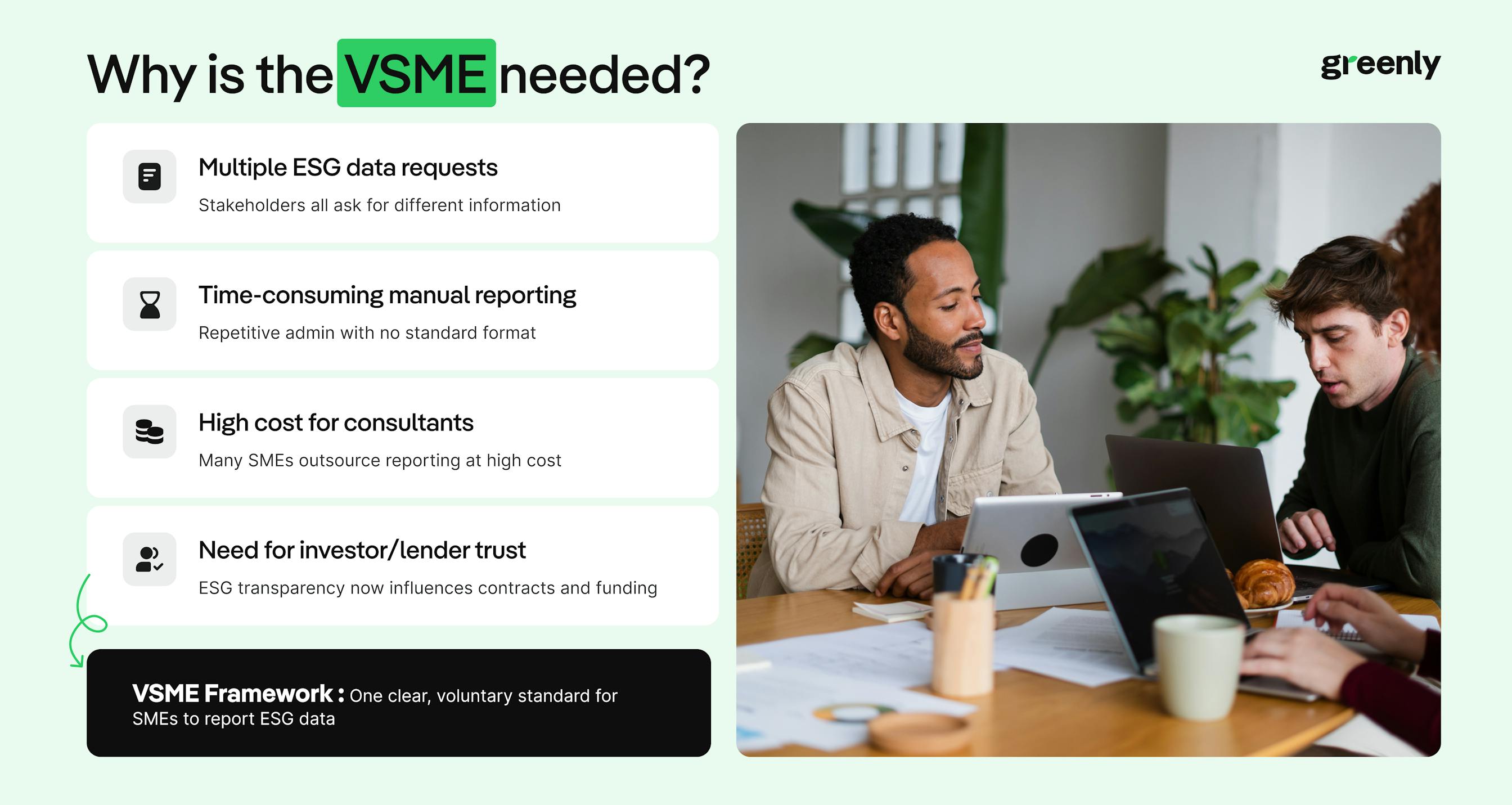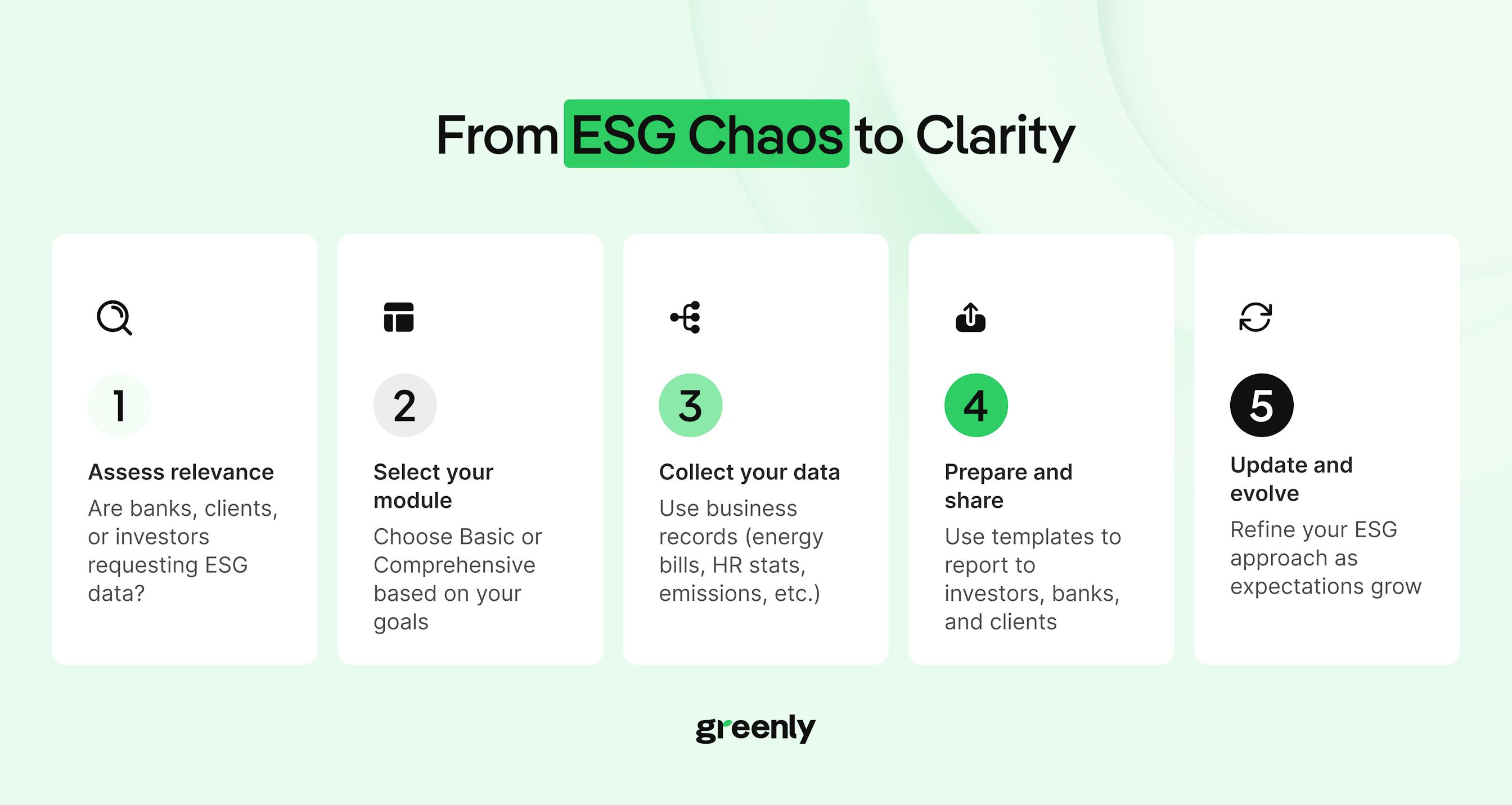
Impacts, Risks, and Opportunities (IRO) for CSRD Reporting
In this article, we’ll break down what IROs are, how to identify and assess them, and what CSRD requires in terms of disclosure.
ESG / CSR
Industries



This puts companies in a difficult position. Unlike large corporations, they might not have dedicated sustainability teams or the resources to produce tailored ESG reports for every request they receive. Instead, many are left struggling to respond to different questionnaires, often spending valuable time and money just to meet the expectations of stakeholders.
Recognising this burden, the European Commission tasked the European Financial Reporting Advisory Group (EFRAG) with developing a voluntary reporting framework specifically for non-listed SMEs.
But what exactly does this new standard cover, and how can SMEs use it to their advantage? In this article, we'll break down the VSME, explain its key features, and explore what it means for SMEs looking to align with growing sustainability expectations.
The European Financial Reporting Advisory Group (EFRAG) developed the VSME at the request of the European Commission, responding to the growing demand for ESG data from SMEs. While larger companies and financial institutions already follow strict sustainability reporting requirements under the Corporate Sustainability Reporting Directive (CSRD), non-listed SMEs are not legally required to disclose ESG information. However, in practice, many SMEs are expected to provide sustainability data to meet the demands of their clients, investors, and banks.
The VSME aims to simplify this process by offering a structured but flexible reporting framework. Instead of SMEs having to complete multiple, uncoordinated ESG questionnaires, the VSME provides a single standard that stakeholders can use to assess sustainability performance.
While the CSRD mandates ESG reporting for large companies and listed SMEs, the VSME is entirely voluntary. It is also:
For many companies, sustainability reporting is becoming an unavoidable part of doing business. Whether applying for loans, securing investment, or maintaining supplier contracts with larger companies, SMEs are increasingly expected to provide environmental, social, and governance data.
This creates three major challenges for micro, small, and medium companies:
Time and resource burden
Small and medium-sized businesses often lack the expertise and staff to produce sustainability reports, let alone customise them for different stakeholders.
High costs
Gathering sustainability information and data, responding to requests, and potentially hiring consultants all come with a price tag.
Risk of lost opportunities
Without an easy way to provide ESG information, businesses may struggle to access green financing, secure contracts with larger companies, or attract sustainability-focused investors.


Recognising these challenges, the European Commission included the VSME as part of its SME Relief Package, published in September 2023. The goal? To provide a simple, standardised sustainability reporting framework for non-listed SMEs.
The European Financial Reporting Advisory Group (EFRAG) was then tasked with developing the VSME standard, which was delivered to the Commission on December 17, 2024.
By introducing a voluntary but standardised ESG reporting tool, the VSME is expected to:
Reduce the reporting burden
One framework instead of multiple ad-hoc data requests.
Attract investors and lenders
A clear ESG report can improve financing opportunities for SMEs.
Integrate sustainability
Simplified reporting encourages more businesses to track their sustainability efforts.
The Voluntary Sustainability Reporting Standard for SMEs (VSME) follows a modular structure, allowing businesses to choose between:
This approach ensures that even the smallest businesses can engage in sustainability reporting without being overwhelmed by unnecessary complexity.
The Basic Module is the starting point for all companies adopting the VSME. It includes 11 key disclosures across environmental, social, and governance (ESG) topics:
| Category | Disclosure | Description |
|---|---|---|
|
General Information
|
1. Basis for preparation | States the reporting framework chosen (Basic or Comprehensive Module) and general company details (legal form, turnover, employee count, etc.). |
| 2. Sustainability practices & plans | Describes the SME's sustainability-related policies and any planned improvements. | |
|
Environmental Metrics
|
3. Energy & GHG emissions | Reports total energy consumption and direct (Scope 1) and indirect (Scope 2) GHG emissions. |
| 4. Pollution | Discloses pollutants emitted to the environment if required by regulations or voluntary reporting systems. | |
| 5. Biodiversity | Reports whether business sites are located in or near biodiversity-sensitive areas. | |
| 6. Water | Reports water consumption and withdrawals, especially in water-stressed regions. | |
| 7. Resource use & circular economy | Reports on waste generation, recycling efforts, and circular economy initiatives. | |
|
Social Metrics
|
8. Workforce – General | Provides employee data, including full-time/part-time breakdown and gender distribution. |
| 9. Workforce – Health & safety | Reports workplace incidents, including work-related injuries and fatalities. | |
| 10. Workforce – Remuneration & rights | Discloses minimum wage compliance, pay gap, union representation, and employee training hours. | |
|
Governance Metrics
|
11. Anti-corruption | Reports any corruption-related convictions and financial penalties, offering insight into the company’s approach to corporate governance and ethical conduct. |
For companies that want to enhance their sustainability reporting, the Comprehensive Module adds 9 more disclosures to the Basic Module. These disclosures are particularly useful for businesses seeking green financing, partnerships with sustainability-driven corporations, or alignment with investor expectations.
| Category | Disclosure | Description |
|---|---|---|
|
General Information
|
1. Strategy: Business model & sustainability | SMEs must disclose their business model and any key sustainability initiatives that are part of their strategy. |
| 2. Policies & future transition initiatives | Businesses must describe their sustainability-related policies and planned sustainability improvements. | |
|
Environmental Metrics
|
3. GHG reduction targets & climate transition | SMEs must disclose any specific targets for reducing greenhouse gas emissions and their strategy for transitioning towards a low-carbon business model. |
| 4. Climate risks | SMEs must assess and report their exposure to climate-related risks, including physical risks (e.g., extreme weather events) and transition risks (e.g., regulatory changes). | |
|
Social Metrics
|
5. Workforce – Additional characteristics | Further workforce details beyond the Basic Module, including employment type and breakdowns by contract type and region. |
| 6. Human rights policies & processes | Disclosure of company policies related to human rights, including labor rights protections, non-discrimination measures, and grievance mechanisms. | |
| 7. Severe human rights incidents | SMEs must report any confirmed incidents of severe human rights violations, such as forced labor, child labor, or other serious breaches. | |
|
Governance Metrics
|
8. Revenues & EU benchmark exclusions | SMEs must disclose revenue from sectors such as fossil fuels, tobacco, or other industries considered high-impact. They must also report whether they are excluded from EU sustainability reference benchmarks. |
| 9. Gender diversity in governance | SMEs must disclose the gender composition of their governance bodies, including senior leadership and board-level representation. |
This modular approach ensures that companies can scale their sustainability reporting efforts depending on their business needs and stakeholder expectations.
One of the main goals of the Voluntary Sustainability Reporting Standard for non-listed SMEs (VSME) is to make ESG reporting as straightforward and accessible as possible. Unlike complex reporting frameworks designed for large corporations, the VSME introduces several key features that simplify the process for companies while still ensuring high-quality sustainability disclosures.
In traditional ESG reporting frameworks, companies are often required to conduct a materiality assessment to determine which sustainability topics are relevant to their business. The CSRD for example requires that companies conduct a double materiality assessment. This process can be time-consuming and resource-intensive, especially for SMEs that often lack dedicated sustainability teams.
The VSME eliminates this burden by adopting an “if applicable” principle - meaning that companies only need to report on topics that are relevant to their business. If a specific disclosure does not apply to a company, there is no requirement to report on it.
Many sustainability reporting standards use highly technical language and complex reporting structures, making it difficult for SMEs to comply. The VSME has been designed with:
As we've already discussed the VSME's two-module system (Basic and Comprehensive) ensures that businesses can choose the level of detail they report based on their specific needs.
This flexibility ensures that companies are not overwhelmed by unnecessary reporting requirements while still providing useful sustainability data to stakeholders.
Unlike mandatory reporting frameworks, the VSME does not require businesses to publicly disclose their sustainability data. The primary purpose of the VSME is to facilitate ESG data sharing between companies and their business partners (such as banks, investors, and large companies).
SMEs can choose to:
Many companies face overlapping and uncoordinated ESG data requests from banks, investors, and corporate clients. The VSME provides a single, standardised framework, helping businesses:
Businesses that can demonstrate sustainability commitments are more attractive to banks, investors, and funding programs. The VSME can help businesses:
Many large companies now require sustainability data from suppliers as part of their own ESG reporting. By adopting the VSME, companies can:
Although the VSME is voluntary, ESG reporting requirements for businesses are evolving fast, and companies that start now will be better prepared to adapt.
Importantly, the VSME remains a voluntary tool, but one that is increasingly seen as a stepping stone to future compliance. EU policymakers have reaffirmed that the VSME plays a complementary role in the EU’s sustainability reporting landscape. For SMEs, it offers a way to start building ESG capabilities now, in a proportionate and cost-effective manner, without waiting for legal obligations to catch up.
Adopting the VSME allows companies to:
Sustainability is becoming a key differentiator in many industries. Companies that report ESG data through the VSME can:

For businesses looking to adopt the Voluntary Sustainability Reporting Standard for SMEs (VSME), the process is designed to be flexible and scalable. While the standard is voluntary, using it effectively can help businesses meet stakeholder expectations, improve access to financing, and prepare for future sustainability requirements.
Before adopting the VSME, companies should assess:
If ESG data requests are becoming more frequent, using the VSME can help provide a structured, widely recognised format that may replace multiple ad-hoc requests.
The VSME allows businesses to start small and expand reporting over time. The Basic Module covers core ESG disclosures and is suitable for companies looking to meet standard stakeholder expectations. The Comprehensive Module adds further disclosures for businesses that need to provide more in-depth ESG data, such as those seeking green financing or positioning themselves as sustainability leaders.
Once the module is selected, SMEs should review the required disclosures and begin collecting relevant data.
For SMEs new to ESG reporting, starting with existing business records (eg. energy bills, HR data) can simplify the process.
The VSME is designed for internal use and communication with stakeholders rather than mandatory public disclosure. SMEs should:
With the growing demand for ESG transparency, the VSME is expected to be widely adopted by financial institutions, investors, and corporate clients. To make the most of the standard, SMEs should:


For businesses adopting the Voluntary Sustainability Reporting Standard for SMEs (VSME), Greenly provides a comprehensive suite of tools, training, and expert guidance to simplify ESG data collection and strategy development. The VSME is designed for non-listed companies, with up to 1,000 employees, helping them build a solid foundation for future ESG reporting. To find out more about Greenly's VSME offer, visit our dedicated page.
Greenly streamlines the data collection process, helping businesses focus on the core sustainability metrics required under the VSME. Businesses can:
Building ESG expertise is crucial for long-term success. Greenly provides:
Greenly helps companies turn ESG data into a strategic asset, ensuring that VSME implementation strengthens long-term sustainability planning. This includes:
While VSME reporting is voluntary, Greenly makes it easy for businesses to share their ESG progress with key stakeholders:
By leveraging Greenly’s platform, businesses can save time, enhance ESG credibility, and build a strong foundation for their long-term sustainability strategy. Get in touch with us today to find out more.